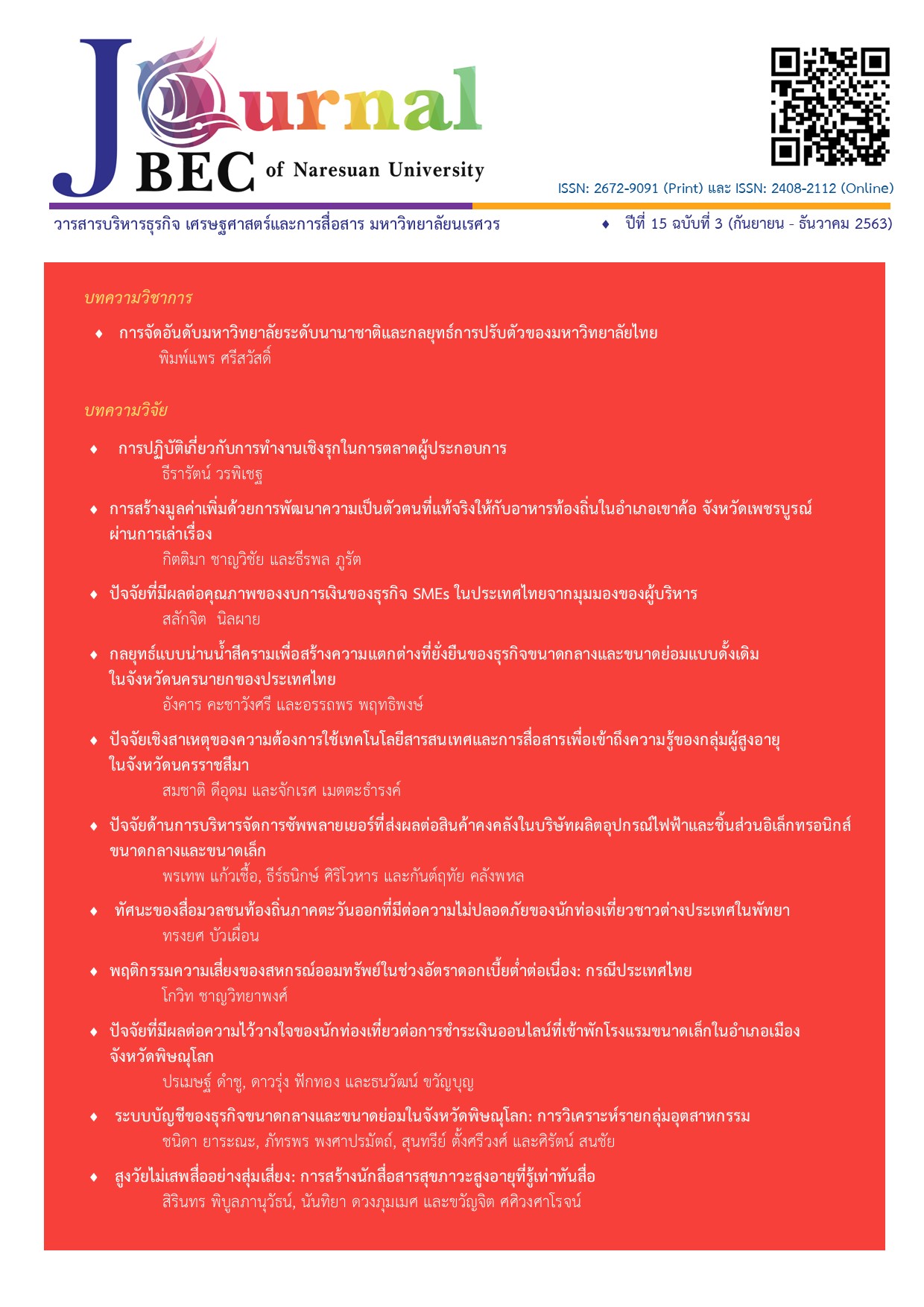การปฏิบัติเกี่ยวกับการทำงานเชิงรุกในการตลาดผู้ประกอบการ
Main Article Content
บทคัดย่อ
งานวิจัยนี้มีวัตถุประสงค์เพื่อจัดหาตัวอย่างการปฏิบัติในการทำงานเชิงรุกของธุรกิจขนาดกลางและขนาดย่อม (SMEs) ภายใต้สิ่งแวดล้อมที่เป็นอุปสรรค เปรียบเทียบกับการทำงานเชิงรับ และเพื่อสำรวจรูปแบบนวัตกรรมที่เป็นผลการวิจัยจัดทำโดยวิธีเชิงคุณภาพ คือ การวิเคราะห์เนื้อหาจากกรณีศึกษา 3 ธุรกิจที่คัดเลือกโดยวิธีเฉพาะเจาะจง พบว่า ธุรกิจกรณีศึกษาทำงานเชิงรุก โดยเปลี่ยนสิ่งแวดล้อมหลังจากศึกษาบริบทที่เกี่ยวข้อง ได้แก่ 1 ขยายผลิตภัณฑ์ให้ครอบคลุมการใช้งานที่เกี่ยวเนื่องทั้งหมดทำให้สามารถเพิ่มจำนวนลูกค้า 2 เลือกลูกค้าเป้าหมายที่คู่แข่งให้ความสนใจน้อยทำให้สามารถลดการแข่งขัน และ 3 เปลี่ยนทัศนคติลูกค้าให้ตรงกับลักษณะสินค้าทำให้ไม่ต้องเปลี่ยนสินค้าตามสภาพสังคม การกระทำทั้ง 3 ข้อก่อให้เกิดนวัตกรรมในการทำงาน ได้แก่ การสร้างสินค้าและบริการเสริมสินค้าหลัก การตั้งราคาต่างจากวิธีการของคู่แข่ง การพัฒนาสินค้าภาพลักษณ์โบราณให้มีคุณภาพดี การนำไปใช้ในเชิงปฏิบัติ คือ SMEs สามารถใช้เป็นตัวอย่าง การนำไปใช้ในเชิงวิชาการ คือ ผลการวิจัยช่วยปิดช่องว่าง คือการขาดแคลนตัวอย่างจริงมาประกอบทฏษฎี
Article Details
เอกสารอ้างอิง
Becherer, R. C., Haynes, P. J. and Helms, M. M. (2008). An exploratory investigation of entrepreneurial marketing in SMEs: the influence of the owner/operator. Journal of Business and Entrepreneurship, 20(2), 44-63.
Becherer, R. C., Helms, M. M. and McDonald, J. P. (2012). The effect of entrepreneurial marketing on outcome goals in SMEs. New England Journal of Entrepreneurship, 15(1), 7-18.
Creswell, J. W. (1998). Qualitative inquiry and research design: Choosing among five traditions. California: Sage Publications Inc.
Dibb, S. (1996). The impact of the changing marketing environment in the Pacific Rim: Four case studies. International Journal of Retail and Distribution Management, 24(11), 16-29.
Franco, M., de Fatima Santos, M., Ramalho, I. and Nunes, C. (2014). An exploratory study of entrepreneurial marketing in SMEs: The role of the founder-entrepreneur. Journal of Small Business and Enterprise Development, 21(2), 265-283.
Gilmore, A. (2011). Entrepreneurial and SME marketing. Journal of Research in Marketing and Entrepreneurship, 13(2), 137-145.
Hacioglu, G., Eren, S. S., Eren, M. S. and Celikkan, H. (2012). The effect of entrepreneurial marketing on firms’ innovative performance in Turkish SMEs. Procedia-Social and Behavioral Sciences, 58, 871-878.
Hendijani F. M. and Seyyed A. N. (2018). The effect of entrepreneurial marketing on halal food SMEs performance. Journal of Islamic Marketing, 9(3), 598-620.
Hoque, A. S. M. M., and Awang, Z. (2016). The sway of entrepreneurial marketing on firm performance: Case of small and medium enterprises (SMEs) in Bangladesh. In Terengganu International Business and Economics Conference (TiBEC-V), (pp. 174-194). Terengganu: Universiti Teknologi Mara (UiTM).
Isichei, E. E., Agbaeze, K. E., & Odiba, M. O. (2020). Entrepreneurial orientation and performance in SMEs. International Journal of Emerging Markets. vol. ahead-of-print no. ahead-of-print
Kampetch, P. and Jitpakdee, R. (2018). Innovation and creativity in community-based tourism management. Journal of Business, Economics and Communications, 14(1), 108-121.
Kickul, J. and Gundry, L. (2002). Prospecting for strategic advantage: the proactive entrepreneurial personality and small firm innovation. Journal of Small Business Management, 40(2), 85-97.
Maholtra, N. K. (2010). Marketing research: an applied orientation (7th ed.). London: Pearson.
Morris, M. H., Schindehutte, M. and LaForge, R. W. (2002). Entrepreneurial marketing: a construct for integrating emerging entrepreneurship and marketing perspectives. Journal of Marketing Theory and Practice, 10(4), 1-19.
Riege, A. M. (2003). Validity and reliability tests in case study research: a literature review with “hands‐on” applications for each research phase. Qualitative market research: An international journal, 6(2), 75-86.
Sandberg, B. (2007). Customer-related proactiveness in the radical innovation development process. European Journal of Innovation Management, 10(2), 252-267.
Sole, M. (2013). Entrepreneurial marketing: conceptual exploration and link to performance. Journal of Research in Marketing and Entrepreneurship, 15(1), 23-38.
Thomas, L. C., Painbeni, S. and Barton, H. (2013). Entrepreneurial marketing within the French wine industry. International Journal of Entrepreneurial Behavior & Research, 19(2), 238-260.


